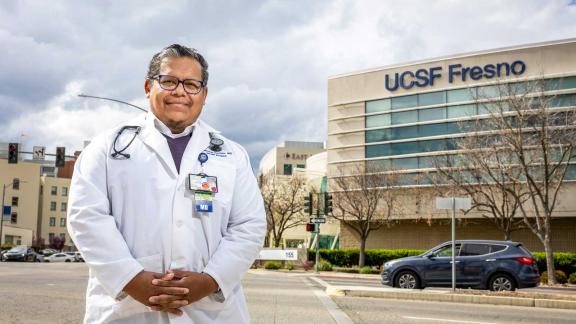MERCED - The University of California, Merced is set to address two pressing issues that affect the overall quality of life in the San Joaquin Valley thanks to three grants totaling nearly $1 million. With the help of a $500,000 contribution from AT&T; $200,000 from the California Emerging Technology Fund and $250,000 from the California Partnership for the San Joaquin Valley, UC Merced is prepared to establish the “San Joaquin Valley eHealth Network Project,” an initiative aimed at creating a telehealth network in the San Joaquin Valley. The landmark project will improve access to health care and connect underserved communities with advanced communications services while providing a fundamental building block for a medical school at UC Merced.
The announcement will be made Wednesday, Sept. 26 at 10 a.m. in the California Room on the UC Merced campus.
The Valley, with more than three million residents is rich in cultural diversity and serves as the bread basket for much of the world. At the same time, the region is medically underserved and suffers from a lack of access to specialty health care. Additionally, the lack of an advanced communications services and information technology infrastructure throughout the Valley prevents some communities from benefiting from economic development opportunities and inhibits the educational attainment of residents
“The University of California system located UC Merced in the San Joaquin Valley to address important issues facing the region,” said Dean of Natural Sciences Maria Pallavicini, who along with UCSF Fresno Associate Dean Joan Voris, is spearheading efforts to establish a medical school in the Valley. “Access to health care, particularly specialty care is a challenge for Valley residents. There also is a digital divide that exists in some parts of our communities. Thanks to these generous grants, UC Merced can begin planning for and implementing an eHealth network, including telemedicine that will help bridge the gaps that exist in these areas.”
According to the American Telemedicine Association, “telemedicine is the use of medical information exchanged from one site to another via electronic communications to improve patients’ health status. Telemedicine is closely associated with “telehealth” or “eHealth,” which, in addition to clinical services, encompasses a broader spectrum of remote health care such as videoconferencing, continuing medical education and transmission of still images.
UC Merced was awarded the California Partnership for the San Joaquin Valley seed grant in April. The intended use of the funds is to establish four eHealth centers in the Valley, with a particular emphasis on underserved and rural regions, along with a hub at UC Merced. The centers will be located at existing health care facilities in the Valley and will provide telemedicine services via videoconferencing with electronic storage and forwarding capabilities, training for physicians and staff and educational opportunities for high school and college students in the region.
More than 100 sites in the Valley from Stockton to Bakersfield and surrounding foothill communities are being considered as eHealth centers. From that number, four sites will be selected.
“The California Partnership for the San Joaquin Valley is pleased to support this effort,” said Connie Conway, co-chair of the California Partnership and vice-chair of the Tulare County Board of Supervisors. “The UC Merced eHealth project is very much like the Partnership because of the unique opportunity it provides as a vehicle for future forward advancement that will affect the quality of life in the region now and for generations to come. Improving the health status of residents and positioning the Valley and its community members to compete in a global economy are among the Partnership’s chief priorities.
” California Emerging Technology Fund monies were awarded this month and will be used to develop a long-term vision for the network, including identifying current and future needs, location of needs and how to best address them.
"The California Emerging Technology Fund is delighted to help bring world-class health care to the San Joaquin Valley in collaboration with UC Merced and the other organizations that make up this unique partnership," said Sunne Wright McPeak, executive director of CETF. "Together we are improving current and future health care access, building a telemedicine strategy to improve health outcomes and control costs, and connecting underserved and rural communities through 21st century telecommunications.”
Funding from the AT&T Foundation also was awarded this month. The grant, to be paid over the next three years, will be used to support the implementation of telemedicine and establishment of eHealth Centers.
“At AT&T, we’re committed to helping the communities where we work and live become stronger, especially by supporting efforts that help connect people from underserved or rural communities to education, technology and health care," explained Eric Johnson, executive director of external affairs for AT&T. "We’re also excited about the many innovative ways that technology can improve lives, and are proud to support UC Merced’s important eHealth initiative that utilizes telemedicine technology to address critical rural health care needs in the San Joaquin Valley."
UC Merced’s eHealth centers are expected to begin service delivery in September 2008.
“While telemedicine and eHealth present unique opportunities to address the Valley’s health care needs, establishing a medical school in the Valley is the surest way to address our tremendous health care provider shortages,” concluded Pallavicini.
UC Merced Medical Education and Health Sciences
UC Merced first announced plans to develop health sciences and medical education programs in the Valley in March 2006. To inform and involve community members in the process, the campus held a series of community meetings throughout the region during March and April 2006. With broad-based support from the Valley, in June 2006, UC Merced submitted a preliminary plan to the UC Office of the President to establish a medical education program leading to a school of medicine. The campus is completing a more detailed program proposal and economic impact report, which will be presented to UC Merced faculty, UC Office of the President and UC Board of Regents in the coming weeks. UC Merced's plan is to establish a medical school to address the disproportionate physician shortage in the Valley, with a particular emphasis on training physicians who are competent in multi-cultural health care and who are committed to serving the needs of the San Joaquin Valley. The proposed medical school is based on academic partnerships and utilizes existing resources in the Valley and sister UC campuses. When submitted, UC Merced's proposal must go through customary University - and state - review and approval processes for consideration of all new programs and schools. Meanwhile, UC Merced continues to grow the two main research arms affiliated with the proposed medical school - biomedical sciences and population-based health research.
About Philanthropy at AT&T
AT&T Inc. is committed to advancing education, strengthening communities and improving lives. Through its philanthropic initiatives and partnerships, AT&T supports projects that create learning opportunities; promote academic and economic achievement; and address community needs. In 2006, AT&T contributed more than $101 million through corporate-, employee- and AT&T Foundation-giving programs. AT&T and the AT&T Foundation, the corporate philanthropy organization of AT&T, combine more than $1.8 billion of historic charitable commitment to communities across the country.
California Emerging Technology Fund
The California Emerging Technology Fund (CETF) has been established as a non-profit corporation pursuant to orders from the California Public Utilities Commission (CPUC) in approving the mergers of SBC-AT&T and Verizon-MCI in 2005. The Mission of the California Emerging Technology Fund is to provide leadership statewide to minimize the Digital Divide by accelerating the deployment and adoption of broadband and other advanced communications services to underserved communities and populations.
California Partnership for the San Joaquin Valley
The California Partnership for the San Joaquin Valley, initiated by an executive order from Governor Schwarzenegger, is an unprecedented effort to bring together public and private leaders and resources to address economic, environmental and social issues in the eight-county San Joaquin Valley, from Kern to San Joaquin counties.





